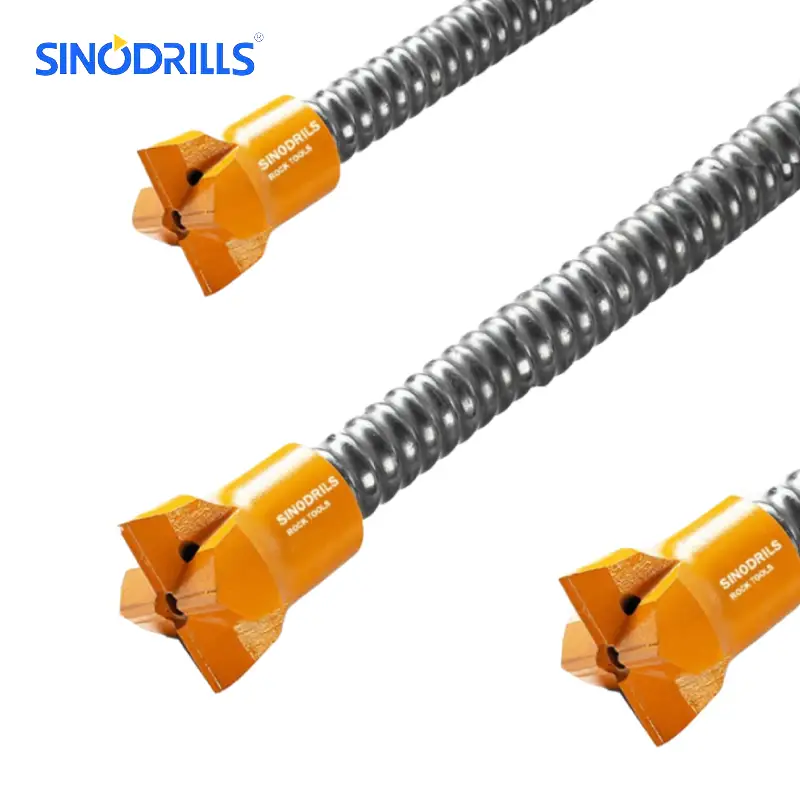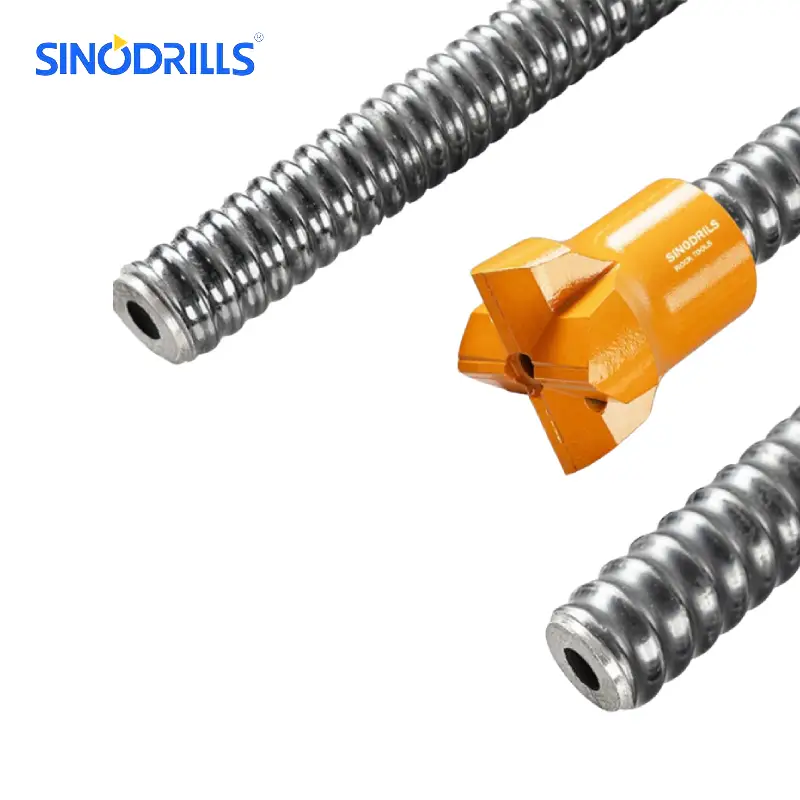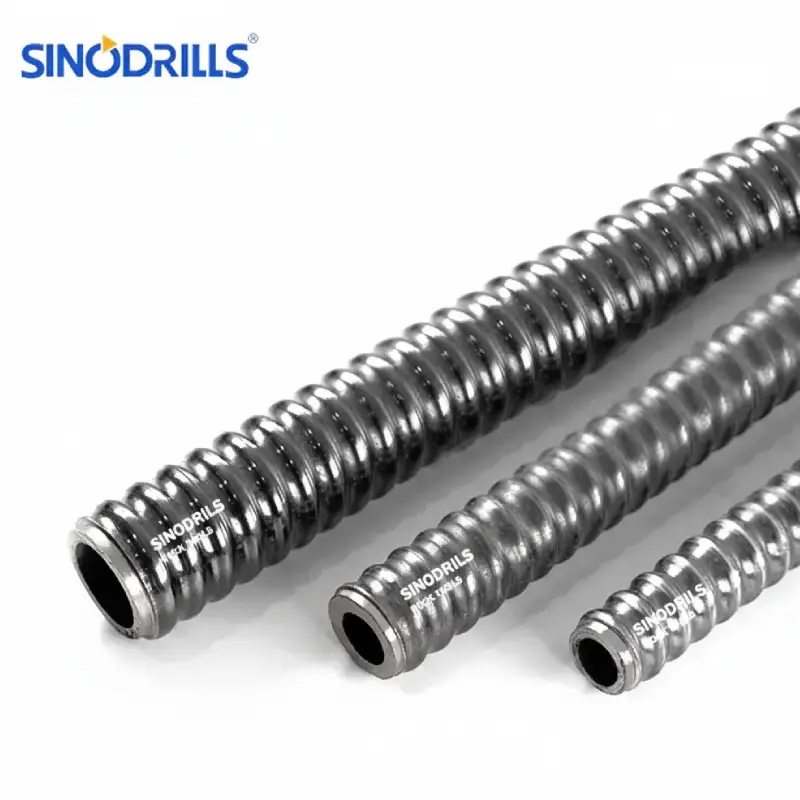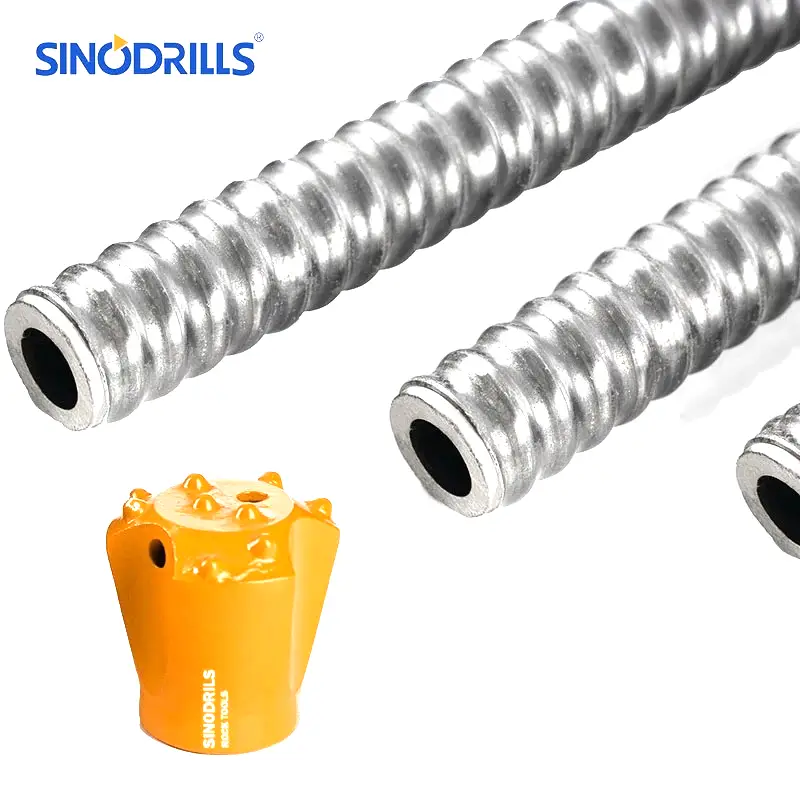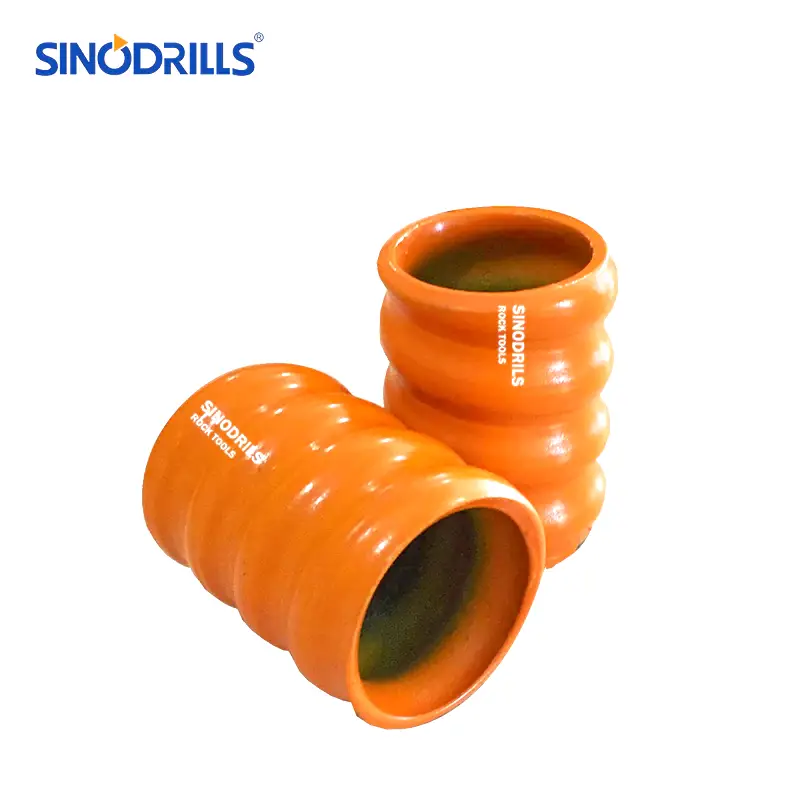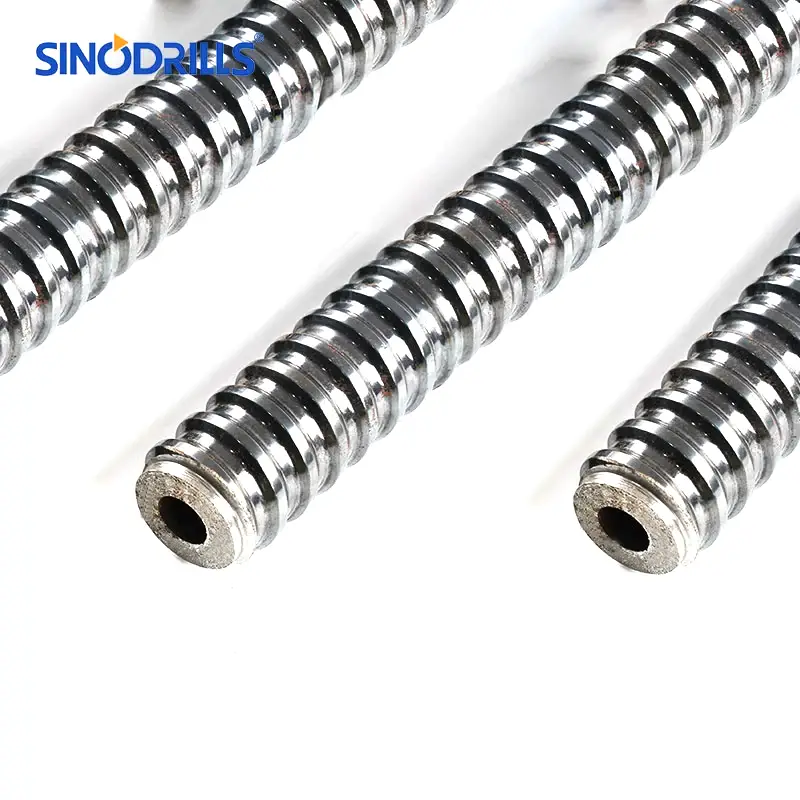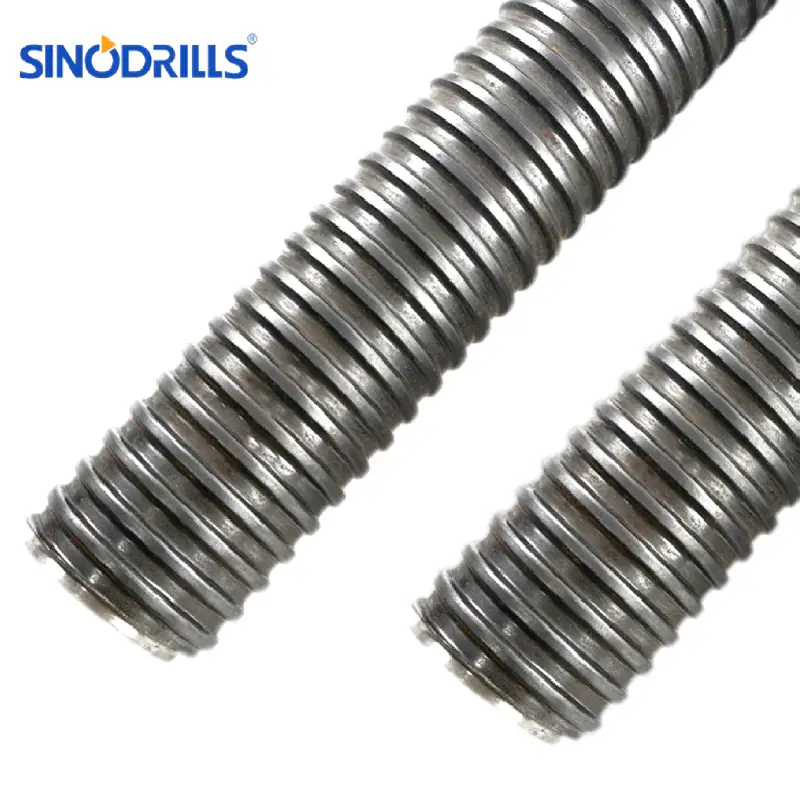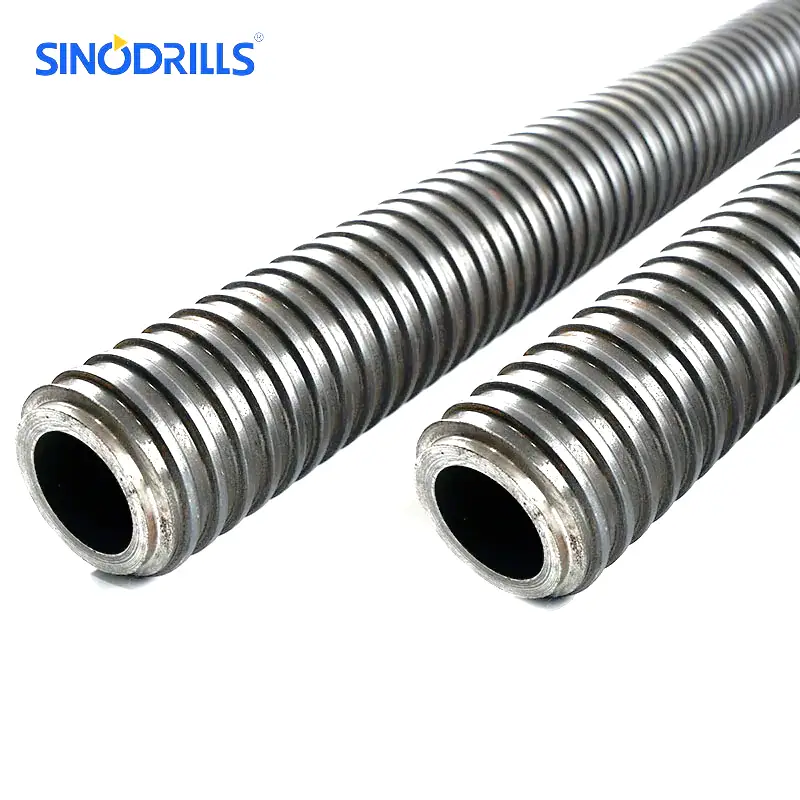Choosing the correct self-drilling anchor bit is crucial for any ground engineering project. The wide variety of available bits, each designed for specific soil and rock formations, can make the selection process complex. Here aims to simplify that decision-making process.
We will explore the key differences between various bit types, from hardened steel to tungsten carbide, and explain how their unique designs are optimized for different geological conditions. By understanding the characteristics of each bit, you can ensure a successful and cost-effective installation, whether you’re working in soft clay or hard rock.
What are Self-Drilling Anchor Bits?
Recommended Self-drilling Anchor Systems
Self-drilling anchor bits are the specialized, sacrificial drill heads used in a self-drilling anchor (SDA) system. Unlike traditional rock anchors that require a separate drilling process before the anchor is installed, SDAs combine both steps into one. The drill bit is attached to a hollow, threaded steel bar and is designed to drill the hole while the bar is simultaneously driven into the ground.
As the drilling progresses, grout can be injected through the hollow bar and out of the bit’s flushing holes, stabilizing the borehole and bonding the anchor in place. This all-in-one process makes them highly efficient for a wide range of ground conditions, especially those that are unstable or prone to collapse.
Self-Drilling Anchor Bit Types

Self-drilling anchor bits are categorized based on their material and design, which are optimized for different ground conditions. The two main types are hardened steel bits and tungsten carbide bits.
Hardened steel bits are generally used for softer, less abrasive ground formations, while tungsten carbide (TC) bits are preferred for harder rock formations due to their superior durability. The specific geometry of each bit, such as the number of cutters or the shape of the cutting face, further tailors it for a particular type of soil or rock.
Hardened Steel Self Drilling Anchor Bits
These bits are crafted from high-quality hardened steel, making them a cost-effective choice for many civil engineering and construction projects. They are best suited for drilling in softer ground, including loose soils, sand, clay, and weak rock. The design of each hardened steel bit is tailored to a specific ground type, ensuring efficiency and effectiveness.
For example, a bit designed for clay will have a wide, spade-like head to prevent clogging, while a bit for sandy soil may have a more pointed or cross-shaped head for better stability and penetration. Their reliability in less demanding environments makes them a workhorse for many foundational and slope stabilization applications.
Tungsten Carbide (TC) Self Drilling Anchor Bits
Tungsten carbide bits are engineered for maximum durability and performance in challenging geological conditions. They feature inserts of tungsten carbide, an extremely hard material, which allows them to cut through medium to strong rock formations, fractured rock, and other abrasive materials that would quickly wear down a hardened steel bit.
The strategic placement of the tungsten carbide inserts, often in the form of buttons or cutters, enables these bits to break up dense rock with a crushing or grinding action. This material choice significantly extends the bit’s lifespan, reducing downtime and costs on projects that require drilling into tough, consolidated ground.
EX Self Drilling Anchor Bit

This all-steel cross bit is designed for drilling in loose to medium dense ground formations. Its four-winged, cross-shaped design provides a balanced cutting action and good flushing characteristics, which helps to efficiently clear away cuttings from the borehole. It is a versatile tool for a wide range of applications, including gravel, sand, and other granular soils.
The symmetrical design of the cross bit ensures drilling stability and helps prevent the bit from deviating from its path. It is a reliable and cost-effective solution for creating anchor holes in typical soil conditions where high abrasion is not a factor.
ESF Self Drilling Anchor Bit
The ESF is a hardened button bit for weak cemented soil/sands and weak fractured rock formations. It features rounded, hardened steel inserts, or “buttons,” on its face. This design provides a crushing and grinding action that effectively breaks up the material, making it suitable for ground that is too hard for a standard spade-style bit.
This bit’s effectiveness is particularly notable in formations with low to moderate compressive strength. The button shape is less prone to jamming and offers good durability in these conditions, providing a more aggressive drilling action than a cross bit.
EW Self Drilling Anchor Bit

This is a clay bit specifically engineered for drilling in soft, cohesive ground like clay and silt. It has a broad, spade-like shape that prevents the bit from becoming clogged with sticky material. The design facilitates easy material removal and maintains a clean cutting edge, which is essential for efficient drilling in these difficult-to-manage soil types.
The simple, yet effective, design of the EW bit is optimized to prevent caking and ensure a smooth drilling process. Its wide cutting surface allows it to move through soft soil with minimal resistance, making it an indispensable tool for these specific geological conditions.
EC Self Drilling Anchor Bit

The EC is a self drilling arch bit for loose to dense soil or sand formations. Its distinctive arched cutting face is designed to provide excellent directional stability and a strong cutting force in granular formations. It is particularly effective in loose to dense soils and sands where maintaining a straight borehole is critical.
The arch design helps guide the bit and reduces the risk of spiraling or deviating from the intended path. It is a robust tool for when you need precision in less cohesive ground. Its durability and stable cutting action make it a reliable choice for a range of soil types.
EY Self Drilling Anchor Bit

This hardened 3-cutters bit is used for weak cemented soil/sand and weak fractured rock formations. It features three cutting wings, providing a balanced and aggressive drilling action. The multiple cutters ensure a smooth, concentric hole while effectively breaking up and removing material.
The three-cutter design offers a compromise between the stability of a cross bit and the cutting power of a button bit. It is a versatile option for mixed ground conditions where you encounter a mix of softer soil and scattered rock, providing a reliable performance in these transitional situations.
EXX Self Drilling Anchor Bit

This is a TC cross bit for medium to strong fractured rock formations. It combines the familiar cross design with the superior durability of tungsten carbide inserts. The carbide inserts can withstand the high impact and abrasion of hard rock, while the cross shape provides a stable and efficient drilling path.
The EXX bit is an upgrade over its hardened steel counterpart, built to tackle more demanding geology. The robust carbide tips allow it to break through tough, fragmented rock formations without excessive wear. It is a staple for projects in mining, tunneling, and other areas where solid, but fractured, rock is the primary material.
ESSF Self Drilling Anchor Bit
The ESSF is a TC button bit designed for strong fractured rock formations. The rounded tungsten carbide buttons are arranged to provide a crushing action that pulverizes solid rock. This bit is the go-to choice for drilling in strong, abrasive, and highly fractured ground where other bits would fail.
Its design minimizes contact with the borehole wall, reducing friction and extending the bit’s life. The durable carbide buttons are highly resistant to wear and heat, making the ESSF a premium tool for demanding applications in hard rock and granite, where efficiency and longevity are paramount.
ECC Self Drilling Anchor Bit

The ECC is a TC arch bit for medium fractured rock formations. This bit combines the stability of the arch shape with the cutting power of tungsten carbide. It is used in medium fractured rock where the added durability of carbide is needed, and the arched cutting face provides excellent guidance, ensuring a straight and true borehole even in heterogeneous formations.
This bit is a step up from the hardened steel arch bit, designed for more challenging and abrasive conditions. Its ability to maintain a stable drilling path while breaking through medium-strength rock makes it a valuable tool in ground that is difficult to penetrate but not quite as hard as that requiring a button bit.
EYY Self Drilling Anchor Bit

The EYY is a TC 3-cutters bit for medium fractured rock formations. It is the tungsten carbide version of the three-cutter design, built to handle medium fractured rock. The three carbide cutters provide a very aggressive and balanced cutting action, making it highly effective at breaking up mixed ground and rock.
The combination of multiple cutters and the strength of tungsten carbide makes this bit a durable and efficient option for a variety of projects. It excels in formations that contain a mix of different materials, providing a smooth drilling experience and a clean hole even when encountering varying rock densities and fracture patterns.
To help visualize the different self-drilling anchor bits, here is a table that summarizes their types, materials, and recommended ground formations.
| Bit Name | Bit Type | Material | Recommended Ground Formations |
| EX | Cross Bit | All Steel | Loose to medium dense ground formations. |
| ES | Button Bit | Hardened Steel | Weak cemented soil/sands and weak fractured rock formations. |
| EW | Clay Bit | Hardened Steel | Soft clay and soils. |
| EC | Arch Bit | Hardened Steel | Loose to dense soil or sand formations. |
| EY | 3-Cutters Bit | Hardened Steel | Weak cemented soil/sands and weak fractured rock formations. |
| EXX | TC Cross Bit | Tungsten Carbide (TC) | Medium to strong fractured rock formations. |
| ESS | TC Button Bit | Tungsten Carbide (TC) | Strong fractured rock formations. |
| ECC | TC Arch Bit | Tungsten Carbide (TC) | Medium fractured rock formations. |
| EYY | TC 3-Cutters Bit | Tungsten Carbide (TC) | Medium fractured rock formations. |
Self-drilling anchor bits are specialized drill heads used in self-drilling anchor systems to simultaneously drill a hole and install the anchor. The table above categorizes the different types based on their material and design, which are crucial for matching the bit to the specific ground conditions of a project.
- Hardened Steel Bits: These bits are made from durable steel and are best for softer ground like soil, sand, and weak rock. They are more cost-effective for less demanding projects.
- Tungsten Carbide (TC) Bits: These bits have tungsten carbide inserts, which are extremely hard and resistant to abrasion. They are designed for drilling in medium to strong fractured rock, where a hardened steel bit would quickly wear out.
The design of each bit—whether it’s a cross, button, arch, or 3-cutter—is optimized for a particular ground composition, ensuring efficient drilling and a successful installation.
How to Choose Suitable Self-drilling Anchor Bits?
Choosing the suitable self-drilling anchor bit is a critical step for a successful and efficient installation. The selection process primarily depends on the specific ground conditions of your project. You must first identify the soil or rock type you will be drilling into, as this will determine the bit’s material and cutting design. For example, soft ground like clay requires a specialized clay bit, while hard, fractured rock demands the durability of a tungsten carbide (TC) bit. Key factors to consider include:
- Ground Formation: Is the soil loose, dense, or cohesive? Is the rock weak, strong, or fractured?
- Bit Material: Choose between hardened steel for softer ground and tungsten carbide (TC) for hard, abrasive rock.
- Bit Design: The geometric shape (e.g., cross, button, arch) should match the ground type for optimal cutting performance and stability.
By carefully assessing these factors, you can select the most appropriate bit to minimize wear, improve drilling speed, and ensure a reliable anchor installation.
Conclusion
Selecting the right self-drilling anchor bit is not just about having the correct tool, it’s about optimizing efficiency and project success. By carefully matching the bit type—be it a hardened cross bit for loose soil or a TC button bit for solid rock—to the specific ground conditions, you ensure proper installation, minimize wear, and avoid costly delays. This foundational knowledge empowers you to make informed decisions for any project.
The wrong bit can lead to a host of problems, including slow drilling, bit failure, and a compromised anchor system. Taking the time to understand the geological formation and selecting a bit specifically designed for those challenges is a small but critical step that yields significant returns in performance and reliability. It’s a key part of professional engineering practice.
For all your ground engineering needs, you can find a comprehensive range of high-quality wholesale self-drilling anchor bits at Sinodrills. Our extensive inventory includes every type of bit discussed, ensuring you have the right tool for any job, from simple soil stabilization to complex tunneling projects. Choose Sinodrills for reliable and durable solutions.

